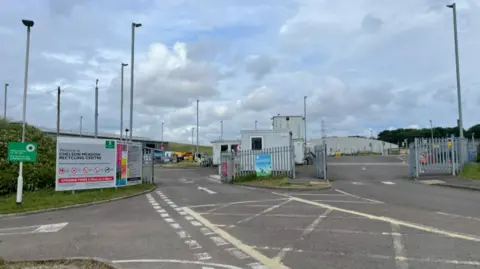New fire prevention plans at recycling centre
 BBC
BBCPlanning consent is being sought for a new fire prevention and suppression system at Plymouth's largest recycling and waste facility.
Biffa Waste Services, which runs the Chelson Meadow facility for Plymouth City Council, said the risk of fires at such centres had "greatly increased" because of lithium batteries used in a multitude of products being dumped.
Planning documents stated a new automated system, Helios, would be used to identify heat spots before fires were noticeable to the human eye.
The system could automatically deploy water cannons before a blaze could take hold and was designed to be used where sprinkler and spray water systems offered insufficient protection.
Adverse noise impacts
The planning documents stated the system utilised infrared heat detection cameras which monitored stockpiles.
The system required some external plant and machinery to be installed, they added.
Biffa said it did not anticipate the proposal, which was in an industrial area, would have adverse noise impacts on neighbours, with the closest property being located 300m (985ft) away.
Lithium batteries were able to hold a powerful charge and, when damaged, could cause intense fires that were capable of reigniting because the batteries could effectively create their own oxygen, Biffa said.
Six billion batteries
Biffa is rolling out a multi-million pound investment programme of Helios fire suppression systems to minimise the risk at its waste management facilities across the UK.
In its application, Biffa said about six billion batteries were thrown away in the last year nationwide - more than 3,000 a minute - with more than 1.1 billion of electricals potentially containing hidden lithium-ion batteries, such as laptops, mobile phones, electric toothbrushes, vapes and earphones.
Such batteries could become crushed or damaged in bin lorries or waste sites if they were not recycled and could cause fires, bosses said.
There were more than 1,200 fires in the waste system in the last 12 months nationally, compared to 700 in 2022, they added.
Follow BBC Devon on X, Facebook and Instagram. Send your story ideas to [email protected].
